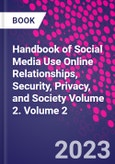Handbook of Social Media Use: Online Relationships, Security, Privacy, and Society explores the determinants of social media use in individuals. This book investigates the ways in which individuals use social media to engage with their social world. This multi-contributed book also discusses the challenges and individual and social risks that may arise from social media, including addiction. Social media platforms provide us with opportunities to engage in our social worlds in ways that are unprecedented.
Social media enhances and transforms how we interact with our social world, both online and offline. With this increase in available individual information and interconnectedness, new avenues for the exploitation and influences of individuals are discovered, hence this book is an ideal resource on the topics covered.
Please Note: This is an On Demand product, delivery may take up to 11 working days after payment has been received.
Table of Contents
1. Individual differences2. Privacy and Security
3. Relationships
4. Challenges
5. Individual and society








